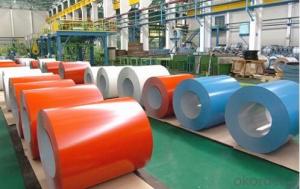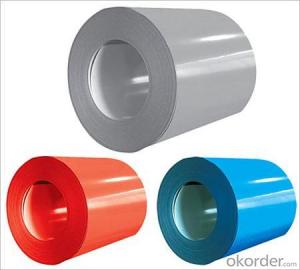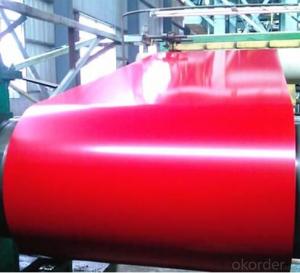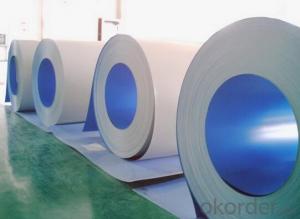PPGI Prepainted Galvanized Steel Coil-Color Coated Aluminium Coil-Roofing Sheet
- Loading Port:
- Tianjin
- Payment Terms:
- TT or LC
- Min Order Qty:
- 30 m.t.
- Supply Capability:
- 10000 m.t./month
OKorder Service Pledge
OKorder Financial Service
You Might Also Like
Item specifice
PPGI Prepainted Galvanized Steel Coil-Color Coated Aluminium Coil-Roofing Sheet
Details of PPGI Prepainted Galvanized Steel Coil-Color Coated Aluminium Coil-Roofing Sheet
Grade | DX51D, SGCC, CGCC |
Thickness | 0.15mm-1.5mm |
Width | 600mm-1500mm(914/1219/1250 are available) |
Standard | JIS G3312, ASTM,GB/T1275 |
Certificate | ISO9001.ISO14001.OHSAS18001 |
Length | As per requests |
Zinc Coating | 40g-275g/m2 |
Lacquer Coated | 20-25 microns/5-15 microns |
Coil ID | 508mm/610mm |
Coil Weight | normally 3-10mt or as your requirement |
Supply ability | 200,000Mt/year (MOQ:25Mt) |
Color | RAL No. |
Price terms | FOB,CFR,CIF |
Payment terms | L/C,T/T |
Deliver time | 30days after received deposit or L/C |
Packing | Standard exporting package |
steel strip Water proof paper, metal covers, | |
Application | Corrugated roofing,outside building, |
boating building,car producing | |
household appliance | |
Main market | Southeast Asia , the EU, Russia, Ukraine , Latin America and other countries and Regions |
Specification of PPGI Prepainted Galvanized Steel Coil-Color Coated Aluminium Coil-Roofing Sheet
Thickness | Width | Length of plate | Inner diameter of coil |
0.18-1.2mm | 800/914/1000/1200/1219/1250mm | 1000-6000mm | 508mm/610mm |
Coated Mass: | |||
Available Coated Mass(g/m^2) | Base plate | Available Coated Mass(g/m^2) | |
60,80, 100, 120, 160, 180 | Galvanized Steel | 60,80, 100, 120, 160, 180 | |
50, 70, 150 | Galvalume Steel | 50, 70, 150 |
Painting | Item | Code | |
Polyester | PE | ||
High-durability polyester | HDP | ||
Silicon modified polyesters | SMP | ||
Polyvinylidene fluoride | PVDF | ||
Easy-Cleaning | — | ||
Painting Thickness | Top side: 20±5microns; | ||
Bottom side: 5~7microns. | |||
Color System | Produce according to RAL Color System or as per buyer’s color sample. | ||
Painting structure | Top surface | Bottom surface |
|
Primer coating | No coating | 1/0 | |
Primer coating | Primer coating | 1/1 | |
Primer coating + Finish coating | No coating | 2/0 | |
Primer coating + Finish coating | Primer coating or single back coating | 2/1 | |
Primer coating + Finish coatin | Primer coating + Finish back coating | 2/2 | |
CNBM Introduction of PPGI Prepainted Galvanized Steel Coil-Color Coated Aluminium Coil-Roofing Sheet
CNBM International Corporation is the most import and export platform of CNBM group(China National Building Material Group Corporation) ,which is a state-owned enterprise, ranked in 270th of Fortune Global 500 in 2015.
With its advantages, CNBM International are mainly concentrate on Cement, Glass, Iron and Steel, Ceramics industries and devotes herself for supplying high quality series of refractories as well as technical consultancies and logistics solution.
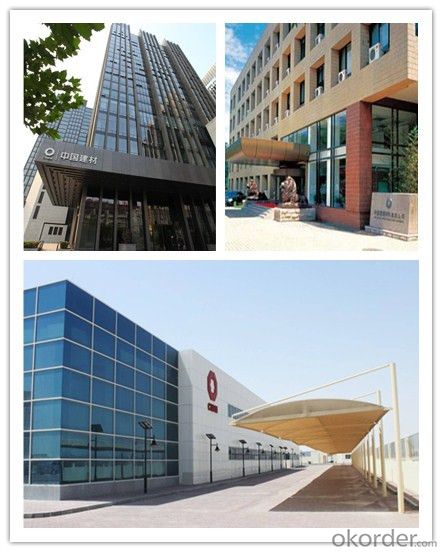
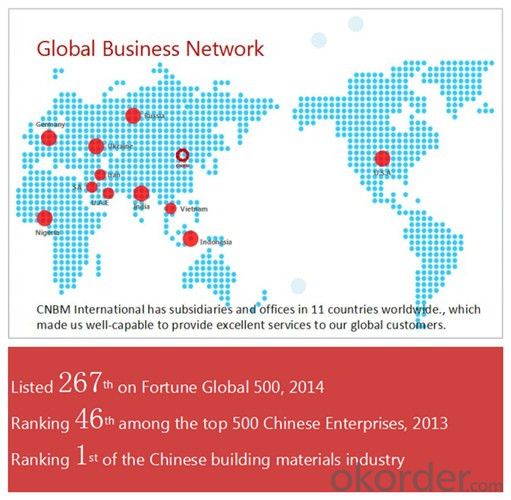
Packaging & Delivery of PPGI Prepainted Galvanized Steel Coil-Color Coated Aluminium Coil-Roofing Sheet
Packaging Detail | Sea worthy packing /as per customer's packing instruction |
Delivery Detail | 15 ~ 40 days after receiving the deposit |
Products Show
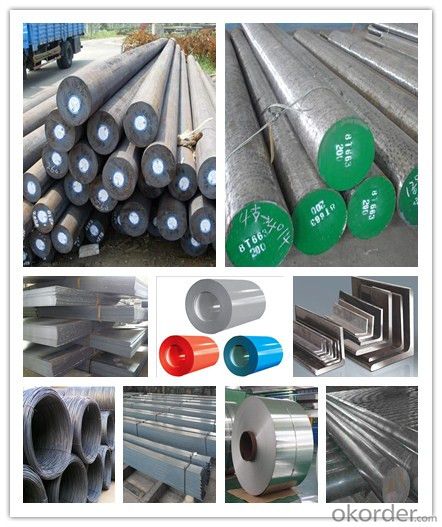
FAQ:
Are you a trading company or manufacturer? | Manufacturer |
What’s the MOQ? | 3 metric ton |
What’s your delivery time? | 15-35 days after downpayment received |
Do you Accept OEM service? | Yes |
what’s your delivery terms? | FOB/CFR/CIF |
What's the Payment Terms? | 30% as deposit,70% before shipment by T/T |
Western Union acceptable for small amount. | |
L/C acceptable for large amount. | |
Scrow ,Paybal,Alipay are also ok | |
Why choose us? | Chose happens because of quality, then price, We can give you both. Additionally, we can also offer professional products inquiry, products knowledge train (for agents), smooth goods delivery, excellent customer solution proposals. |
What's your available port of Shipment? | Main Port, China |
What’s your featured services? | Our service formula: good quality+ good price+ good service=customer's trust
|
Where are your Market? | Covering more than 160 countries in the world |
- Q:How is special steel used in the production of aircraft components?
- Special steel is used in the production of aircraft components due to its exceptional strength, durability, and corrosion resistance. It is utilized in critical areas such as landing gear, engine parts, and structural components to ensure the safety and performance of the aircraft.
- Q:How is stainless steel used in food processing?
- Stainless steel is widely used in food processing due to its hygienic properties and corrosion resistance. It is commonly used to manufacture equipment such as tanks, pipes, and utensils, ensuring that the food remains uncontaminated and safe for consumption. Additionally, stainless steel is easy to clean and maintain, making it an ideal material for food processing environments where cleanliness and sanitation are crucial.
- Q:How does special steel contribute to the packaging aftermarket industry?
- The packaging aftermarket industry greatly benefits from the use of special steel, which provides various advantages that enhance the efficiency and quality of packaging processes. Firstly, special steel is renowned for its exceptional strength and durability, making it ideal for the manufacturing of packaging machinery and equipment. This durability ensures that the machinery can withstand the demanding requirements of the industry, resulting in improved reliability and less downtime. Additionally, special steel boasts excellent resistance to corrosion, making it highly suitable for packaging applications that involve exposure to moisture, chemicals, or extreme temperatures. This corrosion resistance extends the lifespan of packaging equipment and prevents degradation, ultimately reducing maintenance costs and enhancing the overall efficiency of the packaging aftermarket industry. Moreover, special steel can be customized to meet specific needs, allowing for the production of tailored packaging solutions. This flexibility and versatility enable manufacturers to create innovative designs that enhance product protection, optimize space utilization, and improve transportation logistics. For example, special steel can be used to manufacture lightweight yet strong packaging materials, reducing shipping costs and minimizing the environmental impact associated with packaging waste. Furthermore, special steel possesses excellent machinability and weldability, making it easy to fabricate intricate packaging components with high precision. This capability enables manufacturers to produce packaging solutions that perfectly fit specific product dimensions, ensuring optimal protection during transit. In conclusion, special steel plays a vital role in the packaging aftermarket industry by offering strength, durability, corrosion resistance, customization options, and excellent machinability. These qualities contribute to the overall efficiency, reliability, and quality of packaging processes, benefiting both manufacturers and consumers.
- Q:What are the main applications of special steel in the agricultural sector?
- Special steel has various applications in the agricultural sector, primarily in the manufacturing of machinery and equipment. It is used in the production of durable and high-strength components such as plows, tillers, harvesters, and irrigation systems. Special steel's properties, including corrosion resistance and ability to withstand harsh conditions, make it ideal for constructing farm implements that can withstand the demands of agricultural operations. Additionally, special steel is used in the manufacturing of storage tanks, silos, and structures, ensuring the longevity and reliability of agricultural infrastructure.
- Q:What are the main applications of special steel in the packaging industry?
- The main applications of special steel in the packaging industry include the manufacturing of containers, cans, and closures. Special steel offers excellent strength, durability, and corrosion resistance, making it suitable for packaging materials that need to withstand various environmental conditions and protect the contents inside. Its high tensile strength also allows for thinner and lighter packaging, reducing material usage and transportation costs. Additionally, special steel is used in machinery and equipment used for packaging processes, ensuring efficiency and reliability in the production line.
- Q:What are the different forging methods used for special steel?
- Special steel can be forged using several different methods, including open die forging, closed die forging, and ring rolling. Open die forging, also known as smith forging, involves heating the metal and shaping it between flat dies or anvils. The metal is hammered and rotated repeatedly until it reaches the desired shape. This method is ideal for producing customized large and complex shapes. Closed die forging, also known as impression die forging, requires placing the heated metal between multiple dies that have impressions of the final shape. The metal is compressed to fill the impressions and take on the shape of the dies. This method is suitable for producing accurately sized small to medium components. Ring rolling is a specific forging method used to create seamless rings. The metal is heated and positioned between two rollers, which apply pressure to shape the metal into a ring. This technique is commonly used for producing rings with thin walls and large diameters. Secondary forging processes can be employed to further enhance the properties of special steel. Heat treatment, such as annealing or quenching, can improve the material's strength and hardness. Additionally, machining operations can be performed to achieve the desired dimensions and surface finish. The choice of forging method for special steel depends on factors such as the desired shape, size, and properties of the final product. Each method has its own advantages and limitations, and manufacturers select the most appropriate technique based on the specific requirements of the application.
- Q:What are the limitations of welding special steel?
- There are several limitations associated with welding special steel. Firstly, special steels often have high carbon content or alloying elements, which can lead to increased susceptibility to cracking during the welding process. Additionally, special steels may have unique microstructures, such as high hardness or brittleness, which can pose challenges in achieving proper weld penetration and joint strength. Furthermore, the heat input required for welding special steels can result in distortion or warping of the workpiece, requiring additional post-welding processes to correct. Finally, special steels may require specific pre-welding preparations, such as preheating or special welding consumables, which can increase the complexity and cost of the welding process.
- Q:What are the common challenges in heat treating titanium alloys?
- Heat treating titanium alloys can present several common challenges. One of the main challenges is the high reactivity of titanium with oxygen, nitrogen, and hydrogen at elevated temperatures. This reactivity can lead to surface contamination and the formation of undesirable oxides, nitrides, or hydrides, which can affect the mechanical properties of the alloy. Another challenge is the formation of alpha-case, a thick layer of alpha-phase titanium on the surface of the alloy during heat treatment. Alpha-case is brittle and can significantly reduce the fatigue strength and ductility of the material. Therefore, minimizing or eliminating the formation of alpha-case is crucial in heat treating titanium alloys. Furthermore, titanium alloys have a narrow temperature range for effective heat treatment. If the temperature is too low, it may not achieve the desired microstructure and mechanical properties. On the other hand, if the temperature is too high, it can lead to grain growth, which can reduce the strength and toughness of the alloy. Additionally, the heat treatment of titanium alloys often requires precise control of the heating and cooling rates to achieve the desired microstructure and properties. Rapid or uneven cooling can result in non-uniform microstructures, residual stresses, or distortion of the part. Finally, the cost of heat treating titanium alloys can be a challenge. Titanium alloys have a high affinity for oxygen, which necessitates the use of specialized equipment, such as vacuum furnaces or controlled atmosphere furnaces, to maintain a low oxygen environment. These specialized heat treatment processes can be expensive and require careful handling and maintenance to ensure the desired results. In conclusion, the common challenges in heat treating titanium alloys include managing reactivity with oxygen, nitrogen, and hydrogen, minimizing alpha-case formation, achieving the correct temperature range, controlling heating and cooling rates, and dealing with the cost of specialized equipment and processes. Overcoming these challenges is essential to obtain high-quality titanium alloy components with desired properties.
- Q:Can special steel be used in the food packaging industry?
- Yes, special steel can be used in the food packaging industry. Special steel, such as stainless steel, is commonly used in food processing and packaging due to its resistance to corrosion, durability, and easy cleaning properties. It ensures the hygiene and safety of food products, making it suitable for various applications in the food packaging industry.
- Q:What are the requirements for special steel used in mining equipment?
- Special steel used in mining equipment needs to possess certain key requirements. Firstly, it must have high strength and toughness to withstand the harsh and demanding conditions present in mining operations. It should also exhibit excellent wear resistance to endure the abrasive nature of rocks and minerals. Additionally, corrosion resistance is crucial to prevent the steel from deteriorating due to exposure to water, chemicals, and other corrosive substances commonly found in mining environments. Finally, the special steel used in mining equipment should be capable of maintaining its mechanical properties at elevated temperatures, as mining processes often involve high heat generation. Overall, the requirements for special steel in mining equipment revolve around durability, wear resistance, corrosion resistance, and heat resistance.
1. Manufacturer Overview |
|
|---|---|
| Location | |
| Year Established | |
| Annual Output Value | |
| Main Markets | |
| Company Certifications | |
2. Manufacturer Certificates |
|
|---|---|
| a) Certification Name | |
| Range | |
| Reference | |
| Validity Period | |
3. Manufacturer Capability |
|
|---|---|
| a)Trade Capacity | |
| Nearest Port | |
| Export Percentage | |
| No.of Employees in Trade Department | |
| Language Spoken: | |
| b)Factory Information | |
| Factory Size: | |
| No. of Production Lines | |
| Contract Manufacturing | |
| Product Price Range | |
Send your message to us
PPGI Prepainted Galvanized Steel Coil-Color Coated Aluminium Coil-Roofing Sheet
- Loading Port:
- Tianjin
- Payment Terms:
- TT or LC
- Min Order Qty:
- 30 m.t.
- Supply Capability:
- 10000 m.t./month
OKorder Service Pledge
OKorder Financial Service
Similar products
New products
Hot products
Related keywords
